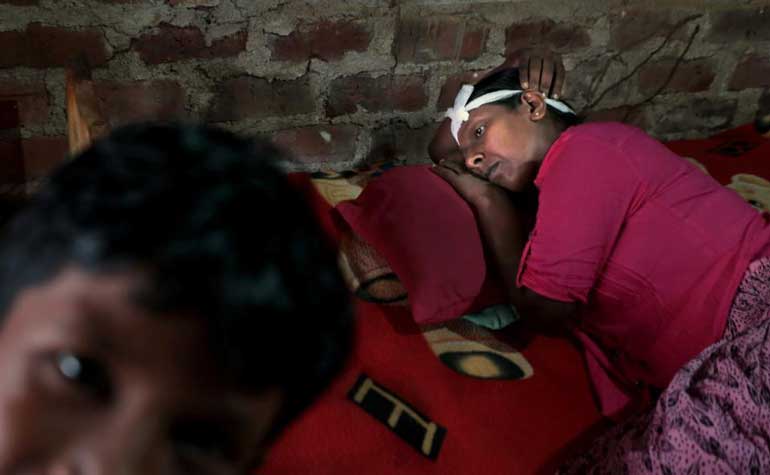Case for a kidney bank
 The kidneys are vital organs of the human body which need to be protected and looked after for good health and long life. Kidneys are beneficial and essential vital organs for the future and the health of a nation infested with poisonous/junk food, polluted water and a polluted environment.
The kidneys are vital organs of the human body which need to be protected and looked after for good health and long life. Kidneys are beneficial and essential vital organs for the future and the health of a nation infested with poisonous/junk food, polluted water and a polluted environment.

Chronic Kidney Disease (CKD) is on the rise at an alarmingly high rate in Sri Lanka and worldwide. The kidneys are among the main precious organs in the human body making urine, removing excess water, controlling body chemicals, toxics and blood pressure, keeping bones healthy, helping maintain red blood corporals and controlling mineral and potassium on blood acidity and many other factors for a healthy life. The kidneys are as important as the heart.
Due to the rapidity of the increase of kidney diseases, governments and non-governmental organisations have set up foundations and institutions. 10% of the world population is suffering from kidney-related diseases and 6% of the Asian population is diabetic with 1.5 million of the world population dying of diabetic-related diseases.
Sri Lanka has four million diabetic patients out of a 22 million population when the world has 382 million diabetic patents, increasing at a rapid rate. NCP has 17.5 diabetic patients in the population and 300 deaths have occurred with 22,000 treated for CKD in one year.
It is understood that there are over 100,000 kidney related patients in Sri Lanka currently adding 5,000 yearly on a very rough estimate. Diabetic related patients are on the rise in Sri Lanka and worldwide due to carelessness and absence of regulatory preventive procedures.
CKD is a threat to India and worldwide due to a number of factors such as poisonous junk food, contaminated water, incorrect food/living patters and mis/over use of drugs being factors closer to the dangerous trend facing mankind on threats of diabetic related diseases leading to CKD.
Kidney transplant is expensive and it is near impossible to find donors due to legal complications and factors beyond the control of the patients, donors and the administration. Few can afford the excessive and enormous expenditure and also meeting the stringent requirements. This has become a world epidemic which has led to corruption and reached the highest levels local and worldwide.
Read More
Saturday, 2 April 2016
 The kidneys are vital organs of the human body which need to be protected and looked after for good health and long life. Kidneys are beneficial and essential vital organs for the future and the health of a nation infested with poisonous/junk food, polluted water and a polluted environment.
The kidneys are vital organs of the human body which need to be protected and looked after for good health and long life. Kidneys are beneficial and essential vital organs for the future and the health of a nation infested with poisonous/junk food, polluted water and a polluted environment.
Chronic Kidney Disease (CKD) is on the rise at an alarmingly high rate in Sri Lanka and worldwide. The kidneys are among the main precious organs in the human body making urine, removing excess water, controlling body chemicals, toxics and blood pressure, keeping bones healthy, helping maintain red blood corporals and controlling mineral and potassium on blood acidity and many other factors for a healthy life. The kidneys are as important as the heart.
Due to the rapidity of the increase of kidney diseases, governments and non-governmental organisations have set up foundations and institutions. 10% of the world population is suffering from kidney-related diseases and 6% of the Asian population is diabetic with 1.5 million of the world population dying of diabetic-related diseases.
Sri Lanka has four million diabetic patients out of a 22 million population when the world has 382 million diabetic patents, increasing at a rapid rate. NCP has 17.5 diabetic patients in the population and 300 deaths have occurred with 22,000 treated for CKD in one year.
It is understood that there are over 100,000 kidney related patients in Sri Lanka currently adding 5,000 yearly on a very rough estimate. Diabetic related patients are on the rise in Sri Lanka and worldwide due to carelessness and absence of regulatory preventive procedures.
CKD is a threat to India and worldwide due to a number of factors such as poisonous junk food, contaminated water, incorrect food/living patters and mis/over use of drugs being factors closer to the dangerous trend facing mankind on threats of diabetic related diseases leading to CKD.
Kidney transplant is expensive and it is near impossible to find donors due to legal complications and factors beyond the control of the patients, donors and the administration. Few can afford the excessive and enormous expenditure and also meeting the stringent requirements. This has become a world epidemic which has led to corruption and reached the highest levels local and worldwide.
Read More

